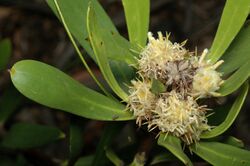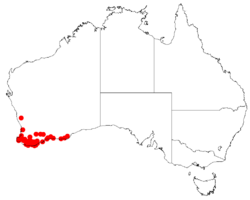Biology:Isopogon attenuatus
| Isopogon attenuatus | |
|---|---|

| |
| In the Australian National Botanic Gardens | |
| Scientific classification | |
| Kingdom: | Plantae |
| Clade: | Tracheophytes |
| Clade: | Angiosperms |
| Clade: | Eudicots |
| Order: | Proteales |
| Family: | Proteaceae |
| Genus: | Isopogon |
| Species: | I. attenuatus
|
| Binomial name | |
| Isopogon attenuatus R.Br.[1]
| |

| |
| Occurrence data from Australasian Virtual Herbarium | |
| Synonyms[1] | |
| |
Isopogon attenuatus is a species of plant in the family Proteaceae and is endemic to the south-west of Western Australia. It is a shrub with oblong to spatula-shaped or linear leaves and spherical heads of yellow flowers.
Description
Isopogon attenuatus is a shrub that typically grows to a height of 0.2–2 m (7.9 in–6 ft 6.7 in) and has mostly glabrous, brownish branchlets. The leaves are oblong to spatula-shaped or linear, 80–240 mm (3.1–9.4 in) long and 10–20 mm (0.39–0.79 in) wide on a petiole about 50 mm (2.0 in) long, with a sharp point on the tip. The flowers are arranged in sessile, more or less spherical heads 40–50 mm (1.6–2.0 in) in diameter. The involucral bracts are egg-shaped, the flowers 10–15 mm (0.39–0.59 in) long and creamy yellow to pale yellow. Flowering occurs from September to February and the fruit is a hairy nut, fused in a more or less spherical head about 25 mm (0.98 in) in diameter.[2][3]
Taxonomy
Isopogon attenuatus was first formally described in 1810 by Robert Brown in the Transactions of the Linnean Society of London.[4][5]
Distribution and habitat
This isopogon grows in woodland with a heathy understorey, in scattered population from near Perth to Albany and Mount Manypeaks, in the south-west of Western Australia.[2][3]
Conservation status
Isopogon attenuatus is classified as "not threatened" by the Government of Western Australia Department of Parks and Wildlife.[3]
References
- ↑ 1.0 1.1 "Isopogon attenuatus". Australian Plant Census. https://biodiversity.org.au/nsl/services/apc-format/display/83663.
- ↑ 2.0 2.1 Foreman, David B.. "Isopogon attenuatus". Australian Biological Resources Study, Department of Agriculture, Water and the Environment: Canberra. https://profiles.ala.org.au/opus/foa/profile/Isopogon%20attenuatus.
- ↑ 3.0 3.1 3.2 "Isopogon attenuatus". FloraBase. Western Australian Government Department of Parks and Wildlife. https://florabase.dpaw.wa.gov.au/browse/profile/2222.
- ↑ "Isopogon attenuatus". APNI. https://id.biodiversity.org.au/instance/apni/501351.
- ↑ Brown, Robert (1810). "On the Proteaceae of Jussieu.". Transactions of the Linnean Society of London 10 (1): 73. https://www.biodiversitylibrary.org/item/13720#page/81/mode/1up. Retrieved 20 November 2020.
Wikidata ☰ Q18075213 entry
 |

